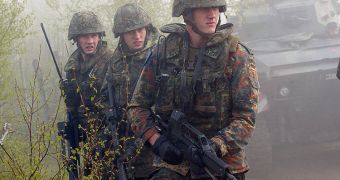An international consortium of universities from the United States and Italy has just been awarded a 5-year, $15 million research contract for developing more efficient, lighter batteries. The US Army is very interested in reducing the weight its troops have to carry into the battlefield.
At this point, an average soldier needs to carry around 35 pounds (16 kilograms) of batteries, in order to power up detection devices, advanced communication systems, electronic weaponry, and so on. This makes them less effective in the battlefield.
The large volume of batteries in the overall effects they carry also implies that they have access to limited amounts of ammo, water and other items that they may require. The excessive weight also limits the amount of armor they can carry.
Reduced mobility and limited firepower significantly alters the balance of power on the battlefield, making soldiers less effective than they could be. The US Army wants to address this issue, at the same time increasing the survivability of its troops.
The researchers tapped to solve this problem are coordinated by experts at the University of Utah, and come from the Boston University, the Rensselaer Polytechnic Institute, Pennsylvania State University, Harvard University, Brown University, the University of California in Davis, and the Polytechnic University of Turin, Italy.
“We want to help the Army make advances in fundamental research that will lead to better materials to help our soldiers in the field. One of Utah's main contributions will be the batteries,” University of Utah computing professor and principal study investigators, Martin Berzins, explains.
“We want to model everything from the nanoscale to the soldier scale," Berzins says. "It's virtual design, in some sense,” he goes on to say. The other UU scientists involved in the study are Mike Kirby, Dmitry Bedrov, Feng Liu and Valeria Molinero, EurekAlert reports.
“Today's soldier enters the battle space with an amazing array of advanced electronic materials devices and systems,” officials from the university wrote to the Army ahead of its selection for this grant.
“The soldier of the future will rely even more heavily on electronic weaponry, detection devices, advanced communications systems and protection systems. It is clear that the energy and power requirements for future soldiers will be much greater,” the document concluded.

 14 DAY TRIAL //
14 DAY TRIAL //